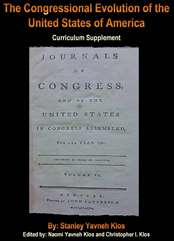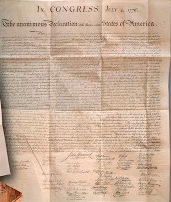by Gerard W. Gawalt
Gerard W. Gawalt is the manuscript specialist for early American history in
the Manuscript Division, Library of Congress.
Ruthless, unconventional foes are not new to the United States of America.
More than two hundred years ago the newly established United States made its
first attempt to fight an overseas battle to protect its private citizens by
building an international coalition against an unconventional enemy. Then the
enemies were pirates and piracy. The focus of the United States and a proposed
international coalition was the Barbary Pirates of North Africa.
Pirate ships and crews from the North African states of Tripoli, Tunis,
Morocco, and Algiers (the Barbary Coast) were the scourge of the
Mediterranean. Capturing merchant ships and holding their crews for ransom
provided the rulers of these nations with wealth and naval power. In fact, the
Roman Catholic Religious Order of Mathurins had operated from France for
centuries with the special mission of collecting and disbursing funds for the
relief and ransom of prisoners of Mediterranean pirates.
Before the United States obtained its independence in the American
Revolution, 1775-83, American merchant ships and sailors had been protected
from the ravages of the North African pirates by the naval and diplomatic
power of Great Britain. British naval power and the tribute or subsidies
Britain paid to the piratical states protected American vessels and crews.
During the Revolution, the ships of the United States were protected by the
1778 alliance with France, which required the French nation to protect
"American vessels and effects against all violence, insults, attacks, or
depredations, on the part of the said Princes and States of Barbary or their
subjects."
After the United States won its independence in the treaty of 1783, it had
to protect its own commerce against dangers such as the Barbary pirates. As
early as 1784 Congress followed the tradition of the European shipping powers
and appropriated $80,000 as tribute to the Barbary states, directing its
ministers in Europe, Thomas Jefferson and John Adams, to begin negotiations
with them. Trouble began the next year, in July 1785, when Algerians captured
two American ships and the dey of Algiers held their crews of twenty-one
people for a ransom of nearly $60,000.
Thomas Jefferson, United States minister to France, opposed the payment of
tribute, as he later testified in words that have a particular resonance
today. In his autobiography Jefferson wrote that in 1785 and 1786 he
unsuccessfully "endeavored to form an association of the powers subject to
habitual depredation from them. I accordingly prepared, and proposed to their
ministers at Paris, for consultation with their governments, articles of a
special confederation." Jefferson argued that "The object of the convention
shall be to compel the piratical States to perpetual peace." Jefferson
prepared a detailed plan for the interested states. "Portugal, Naples, the two
Sicilies, Venice, Malta, Denmark and Sweden were favorably disposed to such an
association," Jefferson remembered, but there were "apprehensions" that
England and France would follow their own paths, "and so it fell through."
Paying the ransom would only lead to further demands, Jefferson argued in
letters to future presidents John Adams, then America's minister to Great
Britain, and James Monroe, then a member of Congress. As Jefferson wrote to
Adams in a July 11, 1786, letter, "I acknolege [sic] I very early thought it
would be best to effect a peace thro' the medium of war." Paying tribute will
merely invite more demands, and even if a coalition proves workable, the only
solution is a strong navy that can reach the pirates, Jefferson argued in an
August 18, 1786, letter to James Monroe: "The states must see the rod; perhaps
it must be felt by some one of them. . . . Every national citizen must wish to
see an effective instrument of coercion, and should fear to see it on any
other element than the water. A naval force can never endanger our liberties,
nor occasion bloodshed; a land force would do both." "From what I learn from
the temper of my countrymen and their tenaciousness of their money," Jefferson
added in a December 26, 1786, letter to the president of Yale College, Ezra
Stiles, "it will be more easy to raise ships and men to fight these pirates
into reason, than money to bribe them."
Jefferson's plan for an international coalition foundered on the shoals of
indifference and a belief that it was cheaper to pay the tribute than fight a
war. The United States's relations with the Barbary states continued to
revolve around negotiations for ransom of American ships and sailors and the
payment of annual tributes or gifts. Even though Secretary of State Jefferson
declared to Thomas Barclay, American consul to Morocco, in a May 13, 1791,
letter of instructions for a new treaty with Morocco that it is "lastly our
determination to prefer war in all cases to tribute under any form, and to any
people whatever," the United States continued to negotiate for cash
settlements. In 1795 alone the United States was forced to pay nearly a
million dollars in cash, naval stores, and a frigate to ransom 115 sailors
from the dey of Algiers. Annual gifts were settled by treaty on Algiers,
Morocco, Tunis, and Tripoli.
When Jefferson became president in 1801 he refused to accede to Tripoli's
demands for an immediate payment of $225,000 and an annual payment of $25,000.
The pasha of Tripoli then declared war on the United States. Although as
secretary of state and vice president he had opposed developing an American
navy capable of anything more than coastal defense, President Jefferson
dispatched a squadron of naval vessels to the Mediterranean. As he declared in
his first annual message to Congress: "To this state of general peace with
which we have been blessed, one only exception exists. Tripoli, the least
considerable of the Barbary States, had come forward with demands unfounded
either in right or in compact, and had permitted itself to denounce war, on
our failure to comply before a given day. The style of the demand admitted but
one answer. I sent a small squadron of frigates into the Mediterranean. . . ."
The American show of force quickly awed Tunis and Algiers into breaking
their alliance with Tripoli. The humiliating loss of the frigate
Philadelphia and the capture of her captain and crew in Tripoli in 1803,
criticism from his political opponents, and even opposition within his own
cabinet did not deter Jefferson from his chosen course during four years of
war. The aggressive action of Commodore Edward Preble (1803-4) forced Morocco
out of the fight and his five bombardments of Tripoli restored some order to
the Mediterranean. However, it was not until 1805, when an American fleet
under Commodore John Rogers and a land force raised by an American naval agent
to the Barbary powers, Captain William Eaton, threatened to capture Tripoli
and install the brother of Tripoli's pasha on the throne, that a treaty
brought an end to the hostilities. Negotiated by Tobias Lear, former secretary
to President Washington and now consul general in Algiers, the treaty of 1805
still required the United States to pay a ransom of $60,000 for each of the
sailors held by the dey of Algiers, and so it went without Senatorial consent
until April 1806. Nevertheless, Jefferson was able to report in his sixth
annual message to Congress in December 1806 that in addition to the successful
completion of the Lewis and Clark expedition, "The states on the coast of
Barbary seem generally disposed at present to respect our peace and
friendship."
In fact, it was not until the second war with Algiers, in 1815, that naval
victories by Commodores William Bainbridge and Stephen Decatur led to treaties
ending all tribute payments by the United States. European nations continued
annual payments until the 1830s. However, international piracy in Atlantic and
Mediterranean waters declined during this time under pressure from the
Euro-American nations, who no longer viewed pirate states as mere annoyances
during peacetime and potential allies during war.
For anyone interested in the further pursuit of information about America's
first unconventional, international war in the primary sources, the Manuscript
Division of the Library of Congress holds manuscript collections of many of
the American participants, including Thomas Jefferson, George Washington (see
the George
Washington Papers), William Short, Edward Preble, Thomas Barclay,
James Madison, James Simpson, James Leander Cathcart, William Bainbridge,
James Barron, John Rodgers, Ralph Izard, and Albert Gallatin.


































